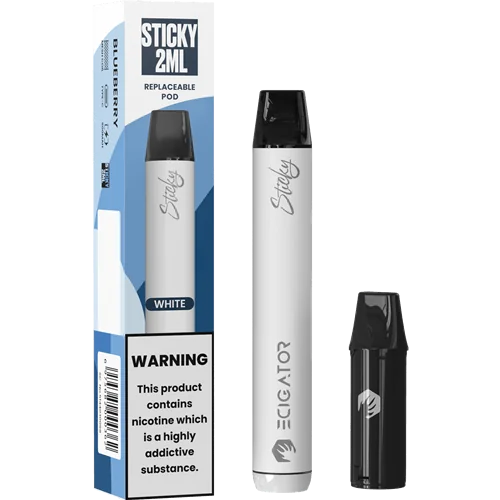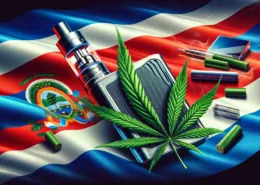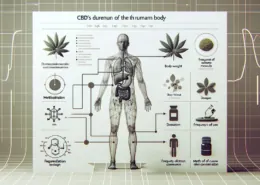Vaping CBD Oil Risks: Alternatives, Regulation Explained
Amidst the growing popularity of vaping, particularly among younger demographics, a new trend has emerged: vaping cannabidiol (CBD) oil. While CBD oil has garnered attention for its potential health benefits, it is crucial to understand the risks associated with vaping this substance, the current state of regulation in the industry, and the safer alternatives available for those seeking to incorporate CBD into their wellness routines.
The Potential Benefits and Limitations of CBD Oil
CBD oil, extracted from the flowers and buds of marijuana or hemp plants, has been touted as a potential treatment for various medical issues, including anxiety, epileptic seizures, inflammation, and sleeplessness. However, it is essential to approach these claims with caution, as more research is needed to verify the efficacy of CBD in treating these conditions.
To date, the Food and Drug Administration (FDA) has approved only one CBD-based medication, specifically for treating seizures associated with two severe forms of epilepsy. While some studies suggest that CBD may have mental health benefits, there is currently insufficient evidence to recommend it as a standalone treatment for any mental health disorder.
It is also important to note that the FDA has issued warnings to manufacturers against making unproven health claims about CBD products, although the agency has not taken significant steps to halt the sale of these items.
The Composition and Legality of CBD Oil
CBD oil typically contains very little, if any, tetrahydrocannabinol (THC), the psychoactive compound responsible for the “high” associated with marijuana use. By law, CBD oil must contain less than 0.3% of THC and is legal in states where medicinal or recreational marijuana is permitted, as well as in several other states with CBD-specific laws.
However, the FDA currently prohibits the marketing of CBD as a food additive or supplement, and the agency cautions consumers that CBD can harm the liver, interact with other medications, and even negatively impact male fertility.
The Dangers of Vaping CBD Oil
Regardless of the substances contained within a vape pen, vaping itself is generally considered an unsafe practice. The Centers for Disease Control and Prevention (CDC) has linked vaping products to an outbreak of nearly 3,000 severe lung illnesses, resulting in hospitalizations and nearly 70 deaths. This condition, known as EVALI (e-cigarette and vaping-associated lung injury), has been traced back to vitamin E acetate, a substance used to dilute oils used in vaping.
However, the risks of vaping CBD oil extend beyond vitamin E acetate. Vape pens obtained from illicit dealers, online sources, or friends can pose significant dangers, with at least 26 EVALI cases linked to vaping CBD oil. Moreover, the long-term effects of inhaling CBD oil are largely unknown, and the chemical reactions that occur when vaping devices are heated could pose additional risks to the lungs, especially in young people.
Potential Side Effects and Lack of Regulation
In addition to the risk of lung injury, vaping CBD may cause various other side effects, including diarrhea, dizziness, drowsiness, fatigue, impaired memory and thinking, nausea, stomach upset, and vomiting. CBD may also worsen anxiety, cause changes in mood, and affect appetite.
The lack of regulatory oversight in the CBD industry compounds these concerns. Although the 2018 Farm Bill removed CBD from the definition of marijuana in the Controlled Substances Act, it remains subject to the same laws and regulations as other substances monitored by the FDA. However, the agency has not yet determined how to regulate CBD vaping products.
This lack of regulation has led to rampant mislabeling of CBD products, with some vaping liquids claiming to contain CBD oil actually containing harmful chemicals that can injure or even kill consumers. A study commissioned by the Associated Press found that out of 30 oils claiming to contain CBD, 10 contained synthetic marijuana, while others had no CBD oil at all or were mislabeled with incorrect CBD concentrations.
Safer Alternatives to Vaping CBD
For those seeking the potential benefits of CBD without the risks associated with vaping, there are alternative methods of administration, such as beverages, capsules, edibles, gummies, nasal sprays, and tablets. However, it is crucial to remember that these products are also unregulated, and research has found that mislabeling affects up to 70% of CBD products sold online.
To minimize the risk of consuming mislabeled or contaminated products, consumers should look for vape manufacturers who utilize third-party testing to verify the ingredients and contents of their CBD offerings. This added layer of transparency can help ensure that the product contains the advertised amount of CBD and is free from harmful contaminants.

Ecigator Sticky Prefilled Pod Kit
The Ecigator Sticky Prefiiled Replaceable Vape Pod Kit is new kind of vape kit which the prefilled disposable pod can be changed.
That means you don’t need to throw away the whole kit but just change another pod. Also you can change the pods to taste different flavors.
The Importance of Consulting with a Healthcare Professional
Before incorporating CBD into a wellness routine, it is essential to consult with a healthcare professional. A knowledgeable physician can provide guidance on the potential risks and benefits of CBD, as well as recommend the most appropriate method of administration based on individual needs and medical history.
Moreover, healthcare professionals can monitor patients for potential side effects and interactions with other medications, ensuring that CBD use is safe and effective. They can also provide valuable insights into the latest research on CBD and help separate fact from fiction in an industry that is often rife with misinformation.
The Future of CBD Regulation and Research
As the popularity of CBD products continues to grow, it is crucial that regulatory agencies like the FDA take steps to ensure the safety and quality of these items. Stronger regulations and oversight can help prevent the sale of mislabeled or contaminated products, protect public health, and foster trust in the CBD industry.
Additionally, ongoing research into the potential benefits and risks of CBD is essential to guide informed decision-making among consumers and healthcare professionals alike. As more high-quality studies are conducted, we can gain a clearer understanding of how CBD may be used to support health and well-being, as well as the most appropriate methods of administration and dosing.
Conclusion
While the potential benefits of CBD are intriguing, the risks associated with vaping CBD oil cannot be ignored. The lack of regulation in the industry, combined with the dangers posed by vaping itself, make this method of CBD consumption a risky choice for consumers.
Until stronger regulations are put in place and more research is conducted, it is crucial to approach CBD use with caution and to prioritize safety above all else. By consulting with healthcare professionals, seeking out reputable manufacturers, and exploring alternative methods of administration, consumers can make informed decisions about incorporating CBD into their wellness routines while minimizing potential risks.
As the CBD industry continues to evolve, it is essential that consumers, healthcare professionals, and regulatory agencies work together to promote transparency, safety, and evidence-based practices. Only then can we fully realize the potential of CBD as a tool for supporting health and well-being.
- How to Choose Safe CBD for Dogs Without Guesswork - August 4, 2025
- Texas Senate Passes Revised THC Ban Bill (SB 5) - August 4, 2025
- Best Delta-8 THC Carts of 2025: Top 5 Vapes Reviewed - July 16, 2025









